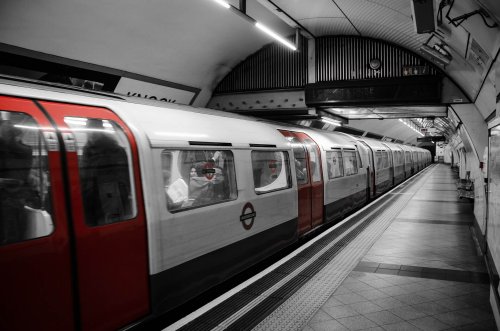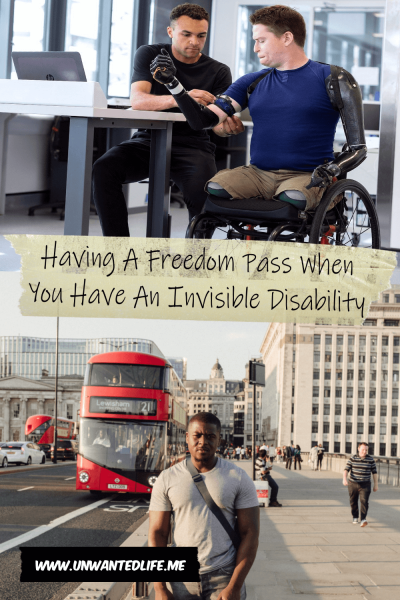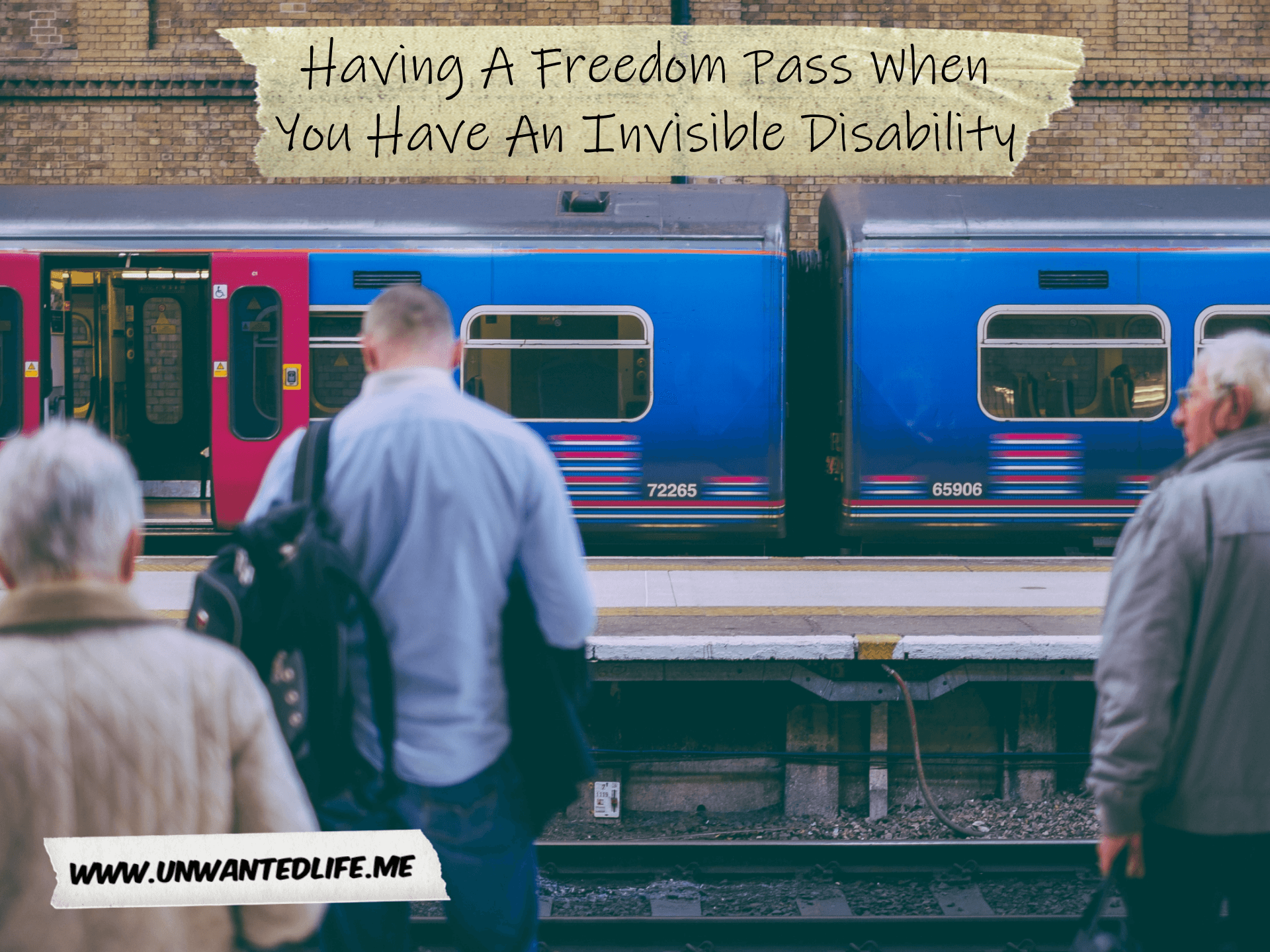A couple of days ago they sent me my very first disability freedom pass. I applied after I realised my health problems meant I would be unsafe to drive. At first, I thought getting this freedom pass was great, but it has come with some unforeseen issues for me.
For those of you who don’t know what a freedom pass is, it’s a travel card that allows you to travel for free. The freedom pass is given to people over 60, whereas the disability freedom pass is given to those with a disability.
I’d often turned down going out because of the expense of travelling to meet people around the city. This was especially true if I was going to have to travel multiple times over the week. One day’s train and tube travel is a significant amount of my money. Hence turning down a lot of plans to meet up.
So surely, getting my disability freedom pass is a good thing? In regards to the money, I’ll save, yes.

At first, I was a little excited to use my disability freedom pass for the first time. I just wanted to go out somewhere solely so I could use it. Just hop on a bus to town or something. But that switched to anxiety pretty quickly.
I get anxious every time I plan to use it now. I’m filled with thoughts that I’ll be questioned for using my disability freedom pass. All because my disabilities are invisible.
Unlike most people that I’ve seen with a disability freedom pass who’ve been in wheelchairs, blind, etc., their disabilities could all be literally seen with your eyes. Me, however, it’s all internal. I have problems with my autonomic nervous system that are affecting my eyes, my balance, my digestive system (My GP Surgery Test Results: Digestive Troubles And Bowel Cancer), and my heart.
It also causes me to have dizzy spells, and lose the ability to move after a minuscule amount of exercise (accompanied by loss of bladder and bowel control, mini-blackouts, and foggy impaired thinking. Then theirs my mental health problems, such as my anxiety disorders.
All my problems mean I’m not safe to drive, and in fact, it would be illegal for me to do so at present. As a result, I met the criteria to apply for a disability freedom pass, so I applied.
I felt like a sham. It didn’t matter that I knew I met the requirements to request I be reviewed for a disability freedom pass. Even though it was deemed that I should have the pass, I still felt like a sham.
Just applying in the first place made me feel like I was trying to take advantage of the system for my own gain. But I was able to manage that by the reality that, if they don’t believe I qualify, they’ll simply reject my application, and I’ll be no worse off than I was before: not having a freedom pass.
But now that I have it, I’m left with the anxiety of not looking like I should have one. Because if you just look at me, you’d have no idea I had many health problems.
“I felt like a fraud”
When I did use my disability freedom pass for the first time, I felt like a fraud. To make matters worse, I also felt guilty when other disabled freedom pass users were in wheelchairs and I was walking around looking all healthy with my pass. I felt this even though my autonomics doctor and the people in charge of reviewing and issuing the disability freedom pass all thought I was deserving of it.
I really hope these feelings pass soon.

It doesn’t help that I keep seeing stories from various news sources of how people with blue disability parking badges keep getting harassed. All because they’re parking in a disability parking spot when they don’t look disabled enough.
“They don’t look disabled enough”
I experienced something similar when I took my mum out for her birthday (A Weekend With My Mum: A Disgusting Society’s Ableism). My mum’s cancer ravaged her bones, causing her to need a walking frame and, at times, a wheelchair. My mum can get around ok most of the time with her walking frame because the damage caused by her cancer was to the bones in her upper body. I know this, but other people don’t, and I had to justify her to people who kept making comments about her behind her back.
I was shocked and disgusted by this behaviour. But it also reinforced the anxiety that was starting to grow in me; an anxiety about having to deal with my own health problems and being accepted. Even my own mother doesn’t take my physical health problems seriously. But then she’s never taken my mental health problems seriously either (Avoidance: Toxic Family And Protecting Your Wellbeing). Even after my suicide attempts and self-harming: although I didn’t tell her until long after these behaviours had started (Childhood Neglect: An Awkward Phone Call With My Mum).
So it’s of little wonder that it’s causing me anxiety to use my disability freedom pass. I’ve never had any support from my mum with my mental and physical health problems. Especially when I’ve seen, both in the news and in person, the kind of harassment people can get for their disability due to the “special treatment” they get.
It won’t stop me from using my disability freedom pass, because it should save me a fair bit of money. Hopefully, this anxiousness will pass after a few months, once I’ve used the pass a lot and nothing happens.
It’ll also be interesting to see if I actually go out more or not, now that the cost of travelling isn’t an issue. I would like to think it would, provided my face doesn’t keep breaking out in disgusting spots: one of the main reasons I don’t go out much and don’t make any plans.
On another note, I also realised theirs potentially another downside to having this pass. I’m clearly not going to walk when I could/should, now that getting a bus is free. Hopefully, I won’t develop that bad habit.
If you live in London and would like to see if you can apply for a freedom pass, then click here.
As always, leave your feedback about my post in the comments section below. Also, feel free to share your experiences of dealing with hidden disabilities and/or have loved ones who don’t support you with your physical/mental health issues in the comments section below as well. If you want to stay up-to-date with my blog, then sign up for my newsletter below. Alternatively, get push notifications for new articles by clicking the red bell icon in the bottom right corner.
Lastly, if you’d like to support my blog, then you can make a donation of any size below as well. Until next time, Unwanted Life readers.


At least if you don’t have it in the pre-provided purple Freedom Pass issued X London Borough holder ony the driver will know. There are a thousands of disabled Londoners that hold Freedom Passes with invisible disavbilities, as I have done since 2009. It is a God-send!
It’s saved me a lot of money since I got mine, not that I’m using it much since the coronavirus made itself known
Honestly I think that society should work more on things like this. The fact that your disability and of others are not visible doesn’t mean they are not there. I know it’s easier said than done, but you shouldn’t feel a fraud for it. I think it should be seen as a chance to be more mobile and also a chance for you to go to appointments without having to worry about the cost on top of everything.
I’ve been using my freedom pass for a while now, so I’ve finally lost my anxiety about it. But the societies stigma about it is still an issue that bugs me
Too many people think a disability has to be something like a missing limb, blindness or wheelchair use and I am horrified at the ignorance surrounding how little so many people know about hidden disabilities. Keep using that pass and keep enjoying your freedom.
I will do, it’s quite the money saver. Not that I’m using at much since the pandemic started
I can relate to this post so much, I was diagnosed with Fibromyalgia and chronic pain so walking can be so painful and I have severe fatigue. Thank you for sharing your experience as it can help so many others.
Lauren – bournemouthgirl
Do you have experience with using something like a freedom pass to travel where you live?
This is the first time I’ve heard of a freedom pass. That’s really nice in terms of saving money, but I understand how it can have downsides too. Having these insecurities of feeling like a fraud or not appearing disabled enough are so valid. I have scoliosis, and although mine (thankfully) isn’t as severe as others, I would often feel guilty every time I refuse to carry heavy stuff. Then my parents would tell me that I have nothing to feel guilty about. I’m the one who’s struggling with scoliosis and I should take care of my body. Maybe that would help. Thanks for sharing! Enlightening…
https://lifebeginsattwenty.com/
It’s a shame we feel this way because of how society is, but we really shouldn’t feel bad about our difficulties
This is a very insightful post about invisible illnesses and the impact that perception has on people. I’d not actually heard of this pass but it makes sense, and you definitely should be using it to get around without it costing a lot for you.
It’s a very common view amount those with invisible disabilities, unfortunately
This is the first time I read about this. I have never heard of a disability freedom pass. I think that is actually amazing except for how you feel about this. I am very sorry you feel that way, it is understandable. But mental health is important and if you didn’t “deserve” that pass, they would reject it as you said. So I think that you should take advantage of that pass because it can help you financially and mentally too.
Indeed, you’re totally right